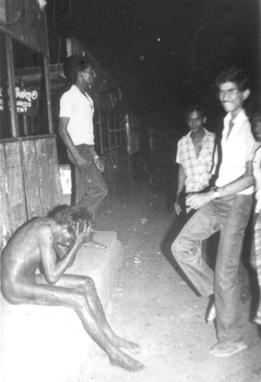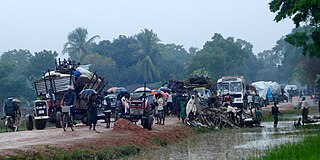
The history of Sri Lanka is unique because its relevance and richness extend beyond the areas of South Asia, Southeast Asia and the Indian Ocean. The early human remains which were found on the island of Sri Lanka date back to about 38,000 years ago.

The Sri Lankan civil war was a civil war fought in Sri Lanka from 1983 to 2009. Beginning on 23 July 1983, it was an intermittent insurgency against the government by the Liberation Tigers of Tamil Eelam led by Velupillai Prabhakaran. The LTTE fought to create an independent Tamil state called Tamil Eelam in the north-east of the island, due to the continuous discrimination and violent persecution against Sri Lankan Tamils by the Sinhalese-dominated Sri Lanka government.

Mahinda Rajapaksa is a Sri Lankan politician. He served as the sixth President of Sri Lanka from 2005 to 2015; the Prime Minister of Sri Lanka from 2004 to 2005, 2018, and 2019 to 2022; the Leader of the Opposition from 2002 to 2004 and 2018 to 2019, and the Minister of Finance from 2005 to 2015 and 2019 to 2021. He has been a Member of Parliament (MP) for Kurunegala since 2015.

The Tamil Eelam Liberation Organization (TELO) is an Eelam Tamil organisation which campaigned for the establishment of an independent Tamil Eelam in the northeast of Sri Lanka during 1972-1987 which later accepted the December 19th proposals. The TELO was originally created as a militant group, and functioned as such until 1986, when most of its membership was killed in a conflict with the Liberation Tigers of Tamil Eelam (LTTE). Its surviving members reorganised themselves as a political party, and it continues to function as such today.

Joseph Pararajasingham was a Sri Lankan Tamil civil servant, journalist, businessman and politician. He was Member of Parliament for Batticaloa District from 1990 to 2004 and a National List Member of Parliament from 2004 to 2005. A member of the Tamil National Alliance, he was shot dead on Christmas Day 2005 as he attended midnight mass at St. Mary's Cathedral, Batticaloa.

Black July was an anti-Tamil pogrom that occurred in Sri Lanka during July 1983. The pogrom was premeditated, and was finally triggered by a deadly ambush on a Sri Lankan Army patrol by the Liberation Tigers of Tamil Eelam (LTTE) on 23 July 1983, which killed 13 soldiers. Although initially orchestrated by members of the ruling UNP, the pogrom soon escalated into mass violence with significant public participation.
Human rights in Sri Lanka provides for fundamental rights in the country. The Sri Lanka Constitution states that every person is entitled to freedom of thought, conscience and religion, including the freedom to have or to adopt a religion or belief of his choice. And, that every person is equal before the law.

The Sri Lankan state has been accused of state terrorism against the Tamil minority as well as the Sinhalese majority, during the two Marxist–Leninist insurrections. The Sri Lankan government and the Sri Lankan Armed Forces have been charged with massacres, indiscriminate shelling and bombing, extrajudicial killings, rape, torture, disappearance, arbitrary detention, forced displacement and economic blockade. According to Amnesty International, state terror was institutionalized into Sri Lanka's laws, government and society.

2006 Trincomalee massacre of students or "Trinco 5" was the murder of five Tamil schoolboys by the Special Task Force (STF) in Trincomalee town on 2 January 2006. The case has received considerable international attention and is regarded as an emblematic case of impunity since no one has been held accountable for the crimes.

Lasantha Manilal Wickrematunge was a high-profile Sri Lankan journalist, politician, broadcaster and human rights activist who was assassinated in January 2009.
Kumar Muthukumar was an Indian journalist and activist based in the state of Tamil Nadu, who came into prominence when he self-immolated protesting against the brutal atrocities against the Sri Lankan Tamil people at the peak of civil war in the country. His death instantly triggered widespread strikes, demonstrations and public unrest in the state, most notably the manifestation of popular defiance of the Government of India ban against the Liberation Tigers of Tamil Eelam, which the people demonstrated carrying flags of Tamil Eelam, placards and images of the LTTE leader V. Prabhakaran in the funeral procession of Muthukumar. Subsequently, 6 more Tamils committed self-immolation in various parts of the globe including India, Malaysia and Switzerland.

The history of Sri Lanka from 1948 to the present is marked by the independence of the country through to Dominion and becoming a Republic.
War crimes during the final stages of the Sri Lankan civil war are war crimes and crimes against humanity which the Sri Lanka Armed Forces and the Liberation Tigers of Tamil Eelam have been accused of committing during the final months of the Sri Lankan civil war in 2009. The war crimes include attacks on civilians and civilian buildings by both sides; executions of combatants and prisoners by both sides; enforced disappearances by the Sri Lankan military and paramilitary groups backed by them; sexual violence by the Sri Lankan military; the systematic denial of food, medicine, and clean water by the government to civilians trapped in the war zone; child recruitment, hostage taking, use of military equipment in the proximity of civilians and use of forced labor by the Tamil Tigers.
Content from the United States diplomatic cables leak has depicted Sri Lanka and related subjects extensively. The leak, which began on 28 November 2010, occurred when the website of WikiLeaks—an international new media non-profit organisation that publishes submissions of otherwise unavailable documents from anonymous news sources and news leaks—started to publish classified documents of detailed correspondence—diplomatic cables—between the United States Department of State and its diplomatic missions around the world. Since the initial release date, WikiLeaks is releasing further documents every day. 3,166 of the 251,287 diplomatic cables obtained by WikiLeaks are from the US Embassy in Colombo, Sri Lanka.

The Tamil genocide refers to the various systematic acts of physical violence and cultural destruction committed against the Tamil population in Sri Lanka during the Sinhala–Tamil ethnic conflict beginning in 1956, particularly during the Sri Lankan Civil War, as acts of genocide. Various commenters have accused the Sri Lankan state of responsibility for and complicity in a genocide of Tamils, and point to state-sponsored settler colonialism, state-backed pogroms, and mass killings, enforced disappearances and sexual violence by the security forces as examples of genocidal acts.
Buddhist scripture condemns violence but varying textual interpretations has been used to allow it. Ahimsa, a term meaning "not to injure", is a primary virtue in Buddhism. However, Buddhists have historically used scriptures to justify violence or form exceptions to commit violence for various reasons. As found in other religious traditions, Buddhism has an extensive history of violence dating back to its inception.
The Tamil genocide resolution of 2015 was passed by the Northern Provincial Council on 10 February 2015 seeking an UN inquiry to investigate the genocide of the Tamil people in Sri Lanka by successive Sri Lankan Governments, and direct appropriate measures at the International Criminal Court outlining the Tamil people had no faith in the domestic commission.
Terrorism in Sri Lanka has been a highly destructive phenomenon during the 20th and 21st centuries, especially so during the periods of the Sri Lankan Civil War (1983–2009) and the first (1971) and second JVP insurrections (1987–1989). A common definition of terrorism is the systematic or threatened use of violence to intimidate a population or government for political, religious, or ideological goals. Sri Lanka is a country that has experienced some of the worst known acts of modern terrorism, such as suicide bombings, massacres of civilians and assassination of political and social leaders. Terrorism has posed a significant threat to the society, economy and development of the country. The Prevention of Terrorism Act of 1978 is the legislation that provides the powers to law enforcement officers to deal with issues related to terrorism in Sri Lanka. It was first enacted as a temporary law in 1979 under the presidency of J. R. Jayewardene, and later made permanent in 1982.
The following lists notable events that occurred during 2016 in Sri Lanka.
Sexual violence against Tamils in Sri Lanka has occurred repeatedly during the island's long ethnic conflict. The first instances of rape of Tamil women by Sinhalese mobs were documented during the 1958 anti-Tamil pogrom. This continued in the 1960s with the deployment of the Sri Lankan Army in Jaffna, who were reported to have molested and occasionally raped Tamil women.










